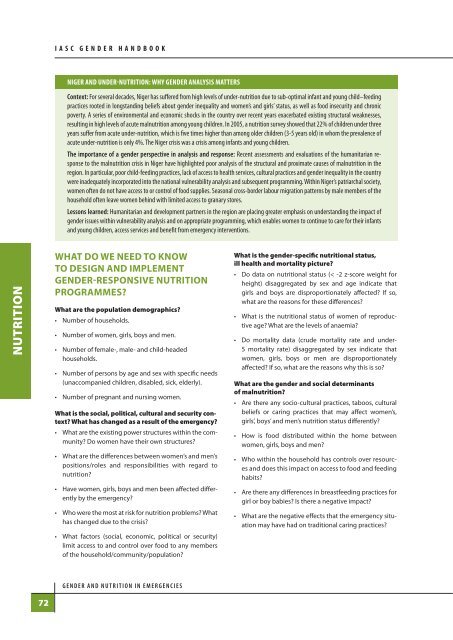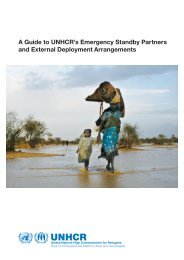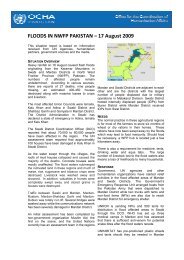Women, Girls, Boys and men - HumanitarianInfo.org
Women, Girls, Boys and men - HumanitarianInfo.org
Women, Girls, Boys and men - HumanitarianInfo.org
You also want an ePaper? Increase the reach of your titles
YUMPU automatically turns print PDFs into web optimized ePapers that Google loves.
nuTRiTiOn<br />
I A s c g e n D e r h A n D b o o k<br />
nIger AnD unDer-nutrItIon: why genDer AnAlysIs mAtters<br />
Context: for several decades, niger has suffered from high levels of under-nutrition due to sub-optimal infant <strong>and</strong> young child–feeding<br />
practices rooted in longst<strong>and</strong>ing beliefs about gender inequality <strong>and</strong> wo<strong>men</strong>’s <strong>and</strong> girls’ status, as well as food insecurity <strong>and</strong> chronic<br />
poverty. a series of environ<strong>men</strong>tal <strong>and</strong> economic shocks in the country over recent years exacerbated existing structural weaknesses,<br />
resulting in high levels of acute malnutrition among young children. in 2005, a nutrition survey showed that 22% of children under three<br />
years suffer from acute under-nutrition, which is five times higher than among older children (3-5 years old) in whom the prevalence of<br />
acute under-nutrition is only 4%. the niger crisis was a crisis among infants <strong>and</strong> young children.<br />
The importance of a gender perspective in analysis <strong>and</strong> response: recent assess<strong>men</strong>ts <strong>and</strong> evaluations of the humanitarian response<br />
to the malnutrition crisis in niger have highlighted poor analysis of the structural <strong>and</strong> proximate causes of malnutrition in the<br />
region. in particular, poor child-feeding practices, lack of access to health services, cultural practices <strong>and</strong> gender inequality in the country<br />
were inadequately incorporated into the national vulnerability analysis <strong>and</strong> subsequent programming. Within niger’s patriarchal society,<br />
wo<strong>men</strong> often do not have access to or control of food supplies. seasonal cross-border labour migration patterns by male members of the<br />
household often leave wo<strong>men</strong> behind with limited access to granary stores.<br />
lessons learned: humanitarian <strong>and</strong> develop<strong>men</strong>t partners in the region are placing greater emphasis on underst<strong>and</strong>ing the impact of<br />
gender issues within vulnerability analysis <strong>and</strong> on appropriate programming, which enables wo<strong>men</strong> to continue to care for their infants<br />
<strong>and</strong> young children, access services <strong>and</strong> benefit from emergency interventions.<br />
WHAT do WE nEEd To knoW<br />
To dESIGn And ImPlEmEnT<br />
GEndEr-rESPonSIVE nuTrITIon<br />
ProGrAmmES?<br />
What are the populat on demograph cs?<br />
• Number of households.<br />
• Number of wo<strong>men</strong>, girls, boys <strong>and</strong> <strong>men</strong>.<br />
• Number of female-, male- <strong>and</strong> child-headed<br />
households.<br />
• Number of persons by age <strong>and</strong> sex with specific needs<br />
(unaccompanied children, disabled, sick, elderly).<br />
• Number of pregnant <strong>and</strong> nursing wo<strong>men</strong>.<br />
What s the soc al, pol t cal, cultural <strong>and</strong> secur ty context?<br />
What has changed as a result of the emergency?<br />
• What are the existing power structures within the community?<br />
Do wo<strong>men</strong> have their own structures?<br />
• What are the differences between wo<strong>men</strong>’s <strong>and</strong> <strong>men</strong>’s<br />
positions/roles <strong>and</strong> responsibilities with regard to<br />
nutrition?<br />
• Have wo<strong>men</strong>, girls, boys <strong>and</strong> <strong>men</strong> been affected differently<br />
by the emergency?<br />
• Who were the most at risk for nutrition problems? What<br />
has changed due to the crisis?<br />
• What factors (social, economic, political or security)<br />
limit access to <strong>and</strong> control over food to any members<br />
of the household/community/population?<br />
G e n d e R A n d n u T R I T I o n I n e m e R G e n C I e S<br />
What s the gender-spec fic nutr t onal status,<br />
ll health <strong>and</strong> mortal ty p cture?<br />
• Do data on nutritional status (< -2 z-score weight for<br />
height) disaggregated by sex <strong>and</strong> age indicate that<br />
girls <strong>and</strong> boys are disproportionately affected? If so,<br />
what are the reasons for these differences?<br />
• What is the nutritional status of wo<strong>men</strong> of reproductive<br />
age? What are the levels of anaemia?<br />
• Do mortality data (crude mortality rate <strong>and</strong> under-<br />
5 mortality rate) disaggregated by sex indicate that<br />
wo<strong>men</strong>, girls, boys or <strong>men</strong> are disproportionately<br />
affected? If so, what are the reasons why this is so?<br />
What are the gender <strong>and</strong> soc al determ nants<br />
of malnutr t on?<br />
• Are there any socio-cultural practices, taboos, cultural<br />
beliefs or caring practices that may affect wo<strong>men</strong>’s,<br />
girls’, boys’ <strong>and</strong> <strong>men</strong>’s nutrition status differently?<br />
• How is food distributed within the home between<br />
wo<strong>men</strong>, girls, boys <strong>and</strong> <strong>men</strong>?<br />
• Who within the household has controls over resources<br />
<strong>and</strong> does this impact on access to food <strong>and</strong> feeding<br />
habits?<br />
• Are there any differences in breastfeeding practices for<br />
girl or boy babies? Is there a negative impact?<br />
• What are the negative effects that the emergency situation<br />
may have had on traditional caring practices?











